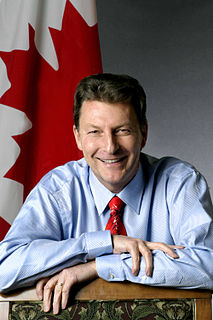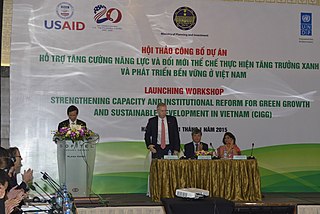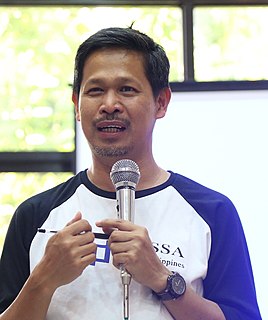
A non-governmental organization (NGO) is an organization that generally is formed independent from government. They are typically nonprofit entities, and many of them are active in humanitarianism or the social sciences; they can also include clubs and associations that provide services to their members and others. Surveys indicate that NGOs have a high degree of public trust, which can make them a useful proxy for the concerns of society and stakeholders. However, NGOs can also be lobby groups for corporations, such as the World Economic Forum.

Corporate social responsibility (CSR) is a form of international private business self-regulation which aims to contribute to societal goals of a philanthropic, activist, or charitable nature by engaging in or supporting volunteering or ethically oriented practices. While once it was possible to describe CSR as an internal organizational policy or a corporate ethic strategy, that time has passed as various national and international laws have been developed. Various organizations have used their authority to push it beyond individual or even industry-wide initiatives. In contrast, it has been considered a form of corporate self-regulation for some time, over the last decade or so it has moved considerably from voluntary decisions at the level of individual organizations to mandatory schemes at regional, national, and international levels.

The United Nations Global Compact is a non-binding United Nations pact to encourage businesses and firms worldwide to adopt sustainable and socially responsible policies, and to report on their implementation. The UN Global Compact is a principle-based framework for businesses, stating ten principles in the areas of human rights, labor, the environment and anti-corruption. Under the Global Compact, companies are brought together with UN agencies, labor groups and civil society. Cities can join the Global Compact through the Cities Programme.

John Norman McKay is a Canadian lawyer and politician. He is the Liberal Member of Parliament for the riding of Scarborough—Guildwood. McKay was Parliamentary Secretary to the Minister of Finance from 2003 to 2006 during the government of Paul Martin, then served as an opposition MP and critic until November 2015 during the government of Stephen Harper. As of April, 2019, he serves as Chair of the Standing Committee on Public Safety and National Security; Chair of the Canadian Section of the Canada-United States Permanent Joint Board on Defence; Chair of the Canada-United Kingdom Inter-Parliamentary Association, Vice-Chair of the Canada-United States Inter-Parliamentary Group, and Counsellor Canadian NATO Parliamentary Association.

Capacity building is the improvement in an individual's or organization's facility "to produce, perform or deploy". The terms capacity building and capacity development have often been used interchangeably, although a publication by OECD-DAC stated in 2006 that capacity development was the preferable term. Since the 1950s, international organizations, governments, non-governmental organizations (NGOs) and communities use the concept of capacity building as part of "social and economic development" in national and subnational plans. The United Nations Development Programme defines itself by "capacity development" in the sense of "'how UNDP works" to fulfill its mission. The UN system applies it in almost every sector, including several of the Sustainable Development Goals to be achieved by 2030. For example, the Sustainable Development Goal 17 advocates for enhanced international support for capacity building in developing countries to support national plans to implement the 2030 Agenda.
Sustainable procurement is a process whereby organizations meet their needs for goods, services, works and utilities in a way that achieves value for money on a life-cycle basis while addressing equity principles for sustainable development, therefore benefiting societies and the environment across time and geographies. Procurement is often conducted via a tendering or competitive bidding process. The process is used to ensure the buyer receives goods, services or works for the best possible price, when aspects such as quality, quantity, time, and location are compared. Procurement is considered sustainable when organizations broadens this framework by meeting their needs for goods, services, works, and utilities in a way that achieves value for money and promotes positive outcomes not only for the organization itself but for the economy, environment, and society. This framework is also known as the triple bottom line, which is a business accounting framework. The concept of TBL is narrowly prescribed, and even John Elkington, who coined the term in the 1990s, now advocates its recall. Indeed, procurement practitioners have drawn attention to the fact that buying from smaller firms, locally, is an important aspect of sustainable procurement in the public sector. Ethics, culture, safety, diversity, inclusion, justice, human rights and the environment are additionally listed as important aspects of SPP.
ICMM was founded in 2001, as a CEO-led leadership organisation, to improve sustainable development performance in the mining and metals industry.
Network governance is "interfirm coordination that is characterized by organic or informal social system, in contrast to bureaucratic structures within firms and formal relationships between them. The concepts of privatization, public private partnership, and contracting are defined in this context." Network governance constitutes a "distinct form of coordinating economic activity" which contrasts and competes with markets and hierarchies.
Creating shared value (CSV) is a business concept first introduced in a 2006 Harvard Business Review article, Strategy & Society: The Link between Competitive Advantage and Corporate Social Responsibility. The concept was further expanded in the January 2011 follow-up piece entitled "Creating Shared Value: Redefining Capitalism and the Role of the Corporation in Society". Written by Michael E. Porter, a leading authority on competitive strategy and head of the Institute for Strategy and Competitiveness at Harvard Business School, and Mark R. Kramer, Kennedy School at Harvard University and co-founder of FSG, the article provides insights and relevant examples of companies that have developed deep links between their business strategies and corporate social responsibility (CSR). In 2012, Kramer and Porter, with the help of the global not-for-profit advisory firm FSG, founded the Shared Value Initiative to enhance knowledge sharing and practice surrounding creating shared value globally.
The Sustainable Commodity Initiative (SCI) is a joint initiative launched by the International Institute for Sustainable Development (IISD) and the United Nations Conference on Trade and Development (UNCTAD) in 2003. The SCI was formed to facilitate the development and implementation of sustainable commodity production and trade on a global scale by working with the international community. The aim of the initiative is to enhance social, environmental, and economic welfare on a global scale. SCI works collaboratively with producers and producer organizations, the private sector, government institutions and development focused NGOs. It is also compatible with UNCTAD's Voluntary Sustainability Standards (VSS). SCI is funded through governments worldwide, United Nations agencies, foundations, the private sector, and individual donors.
The Manchester Local Sustainable Development Plan was prepared by the Manchester Parish Council (MPC) and the Manchester Parish Development Committee (MPDC), located in Mandeville, Jamaica, in Manchester Parish, and publicly presented to the community in July 2007. The Development Plan was completed after a thorough process of participation and citizen’s mobilization that took five years. This document is the first of its kind in the country and in the English speaking Caribbean. The Plan is based on the principles of community driven development, bottom-up democracy and local capacity building to achieve sustainable development.
Stakeholder engagement is the process by which an organization involves people who may be affected by the decisions it makes or can influence the implementation of its decisions. They may support or oppose the decisions, be influential in the organization or within the community in which it operates, hold relevant official positions or be affected in the long term.
The Office of the Extractive Sector CSR Counsellor was established in 2009 as part of the Government of Canada’s CSR Strategy for the International Extractive Sector. The mandate of the Counsellor is defined by an Order in Council.
NGO 2.0 project is designed to enhance the digital and social media literacy of grassroots NGOs in the underdeveloped regions of China. The Project was launched by Prof Jing Wang, in collaboration with the University of Science and Technology of China, NGO Communication Net, Friends of Nature, Sun Yat-sen University, and Ogilvy & Mather Beijing and Shanghai. In 2011, Tsinghua University's Future Media Center joined the partnership. Secondary partners include Naranda Foundation, MilwardBrown, and CreditEase Co. (2010-2011).
Sustainability standards and certifications are voluntary guidelines used by producers, manufacturers, traders, retailers, and service providers to demonstrate their commitment to good environmental, social, ethical, and food safety practices. There are over 400 such standards across the world.

Edwin Gariguez is a Filipino religious leader and environmentalist. He was awarded the Goldman Environmental Prize in 2012, for his voicing of protests on behalf of indigenous communities against large scale mining projects in the Philippines. Edwin Gariguez was the former executive secretary of National Secretariat for Social Action (NASSA), the humanitarian, advocacy and social development arm of the Catholic Bishops' Conference of the Philippines (CBCP).
Multistakeholder governance is a practice of governance that employs bringing multiple stakeholders together to participate in dialogue, decision making, and implementation of responses to jointly perceived problems. The principle behind such a structure is that if enough input is provided by multiple types of actors involved in a question, the eventual consensual decision gains more legitimacy, and can be more effectively implemented than a traditional state-based response. While the evolution of multistakeholder governance is occurring principally at the international level, public-private partnerships (PPPs) are domestic analogues.
The Alliance for Middle East Peace (ALLMEP) is the largest and fastest-growing network of Palestinian and Israeli peace-builders. They envision a Middle East in which this community leads their societies toward and beyond a sustainable peace. With a coalition of over 150 organizations—and tens of thousands of Israelis and Palestinians—they foster cooperation that increases impact, adds stability in times of crisis, and builds an environment conducive to peace over the long term.

National Skill Development Corporation (NSDC) is a not-for-profit public limited company incorporated on July 31, 2008 under section 25 of the Companies Act, 1956. NSDC was set up by Ministry of Finance as Public Private Partnership (PPP) model. The Government of India through Ministry of Skill Development & Entrepreneurship (MSDE) holds 49% of the share capital of NSDC, while the private sector has the balance 51% of the share capital.

Corporate Environmental Responsibility (CER) refers to a company's duties to abstain from damaging natural environments. The term derives from corporate social responsibility (CSR).







